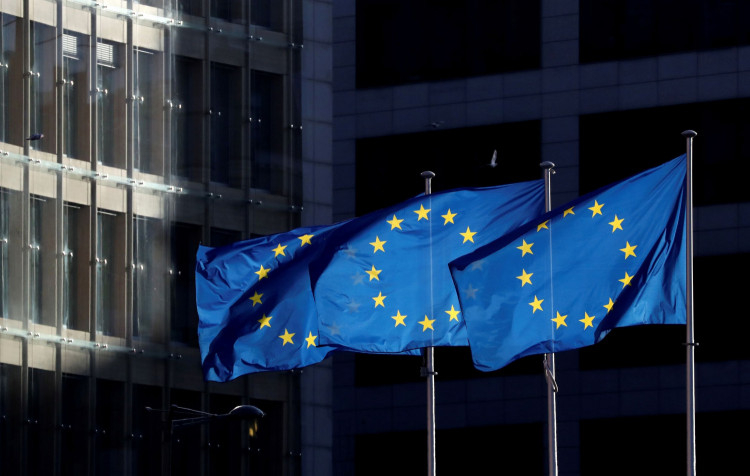Due to the stubbornly high prices of energy and food, household spending has drastically slowed, and the Eurozone economy fell into a recession at the beginning of this year.
On June 8, local time, the European Union Statistics Bureau announced revised data showing that the Eurozone's GDP declined by 0.1% quarter-on-quarter in Q1, down 0.2% from the initial value. The Eurozone's GDP also declined by 0.1% in Q4 of the previous year. Two consecutive quarters of GDP contraction signifies a technical recession in the Eurozone. The GDP of European Union nations increased by 0.1% quarter-on-quarter in Q1.
Year-over-year, the Eurozone's Q1 GDP, after seasonal adjustments, was at 1%, marking the fourth consecutive quarter of decline, below the expected 1.2% and the previous 1.8% value. It is the lowest record since Q1 2021. The GDP of European Union nations grew by 1% year-over-year in Q1, which was also significantly lower than the previous 1.7%.
The European Union Statistics Bureau had previously predicted a slight increase in the Eurozone economy in Q1, but significant changes in data from Germany and Ireland have led to an economic contraction in the Eurozone in Q1.
According to data from the European Union Statistics Bureau, seven economies in the Eurozone contracted at the beginning of the year. Germany, Europe's largest economy, saw its GDP decline by 0.2% year-over-year and 0.3% quarter-on-quarter in Q1. Ireland's GDP fell by 4.6% in Q1, much more than expected. GDP data released yesterday by Greece showed an unexpected contraction in the Greek economy in Q1. Lithuania, Malta, and the Netherlands also entered contraction in Q1.
Economists predict that the economy will rebound in Q2 as a drop in energy prices eases household budget pressures, but the rebound may not be as strong as expected. Although energy prices have normalized from their 2022 peak, food prices continue to rise rapidly, further weakening household spending.
The chief European economist at Capital Economics said that the decline in the Eurozone economic confidence index exceeded expectations, indicating that the Eurozone economy will remain weak in Q2:
The Eurozone Investor Confidence Index dropped from -13.1 in May to -17.0 in June, far below market expectations.
The drop in confidence is widespread across industries, with declines in manufacturing, services, and retail. However, the survey also shows that price pressures are continuing to ease, especially in manufacturing.
The Eurozone is still experiencing stagflation, and since potential inflation may only slowly decline, the European Central Bank might further raise interest rates and maintain them at peak levels until next year.
ING's chief macro analyst, Carsten Brzeski, tweeted that the recession is finally here, the resilience of the economy has gone with the wind, and "stagnation" is coming head-on.
However, S&P Global Market Intelligence believes that the service industry will drive the Eurozone's GDP to rise in Q2, but the effect of austerity policies will continue to appear, and a recession will occur again at the end of 2023 or early 2024.
Germany, in Recession
Under multiple risks, such as the aftermath of the energy crisis, high inflation, and banking crisis, Germany, the "locomotive of the European economy," couldn't escape the fate of recession. The stalling of the locomotive has also become a significant reason for the Eurozone's recession.
Because of significant declines in manufacturing data, there is a severe drag on the outlook for the German economy. The outlook for German businesses has worsened for the first time since October of last year.
Germany's initial PMI for manufacturing in May was 42.9, the lowest since May 2020. The negative growth trend of new orders is quite common in most sectors of manufacturing.
At present, Germany's economic recovery is extremely uneven, with a contraction in commodity demand. Although the service industry is strong, it could also be affected in the future. ING economist Carsten Brzeski pointed out that the service industry might be affected by weak manufacturing activity and falling disposable income.
Economists at Commerzbank in Germany believe that the possibility of continued economic decline in the second half of the year seems greater.
Signs of Stagflation Emerge, ECB in a Dilemma
ECB officials have repeatedly stated that even if inflation soars to a record high, it is still possible to avoid an economic recession. Therefore, this outcome will be a significant blow to central bank officials.
At the ECB's interest rate meeting on June 15, it is likely that the deposit interest rate will be raised again by 25 basis points, to 3.5%. Since July of last year, the European Central Bank has adopted unprecedented monetary tightening measures.
Jack Allen-Reynolds, an economist at research institution Capital Economics, said that although core inflation has peaked, this year's Eurozone inflation data faces much statistical noise. Wage and service inflation pressures may keep core inflation high, and he believes that the European Central Bank will further raise interest rates in June and July.
The market generally predicts that the ECB will raise interest rates by another 25 basis points in June, and interest rates will peak after another 25 basis point increase in July. However, some people think that the interest rate hike may need to continue until September to bring inflation back to the 2% target level sustainably.
Members of the ECB have repeatedly pointed out that the conditions are not yet available to "declare victory" or be satisfied with the inflation outlook. Members unanimously believe that further tightening is needed to bring inflation back to the 2% target in the medium term.
The ECB may further raise interest rates to curb demand, and the cost of bank loans is getting higher. The interest rate hike has not yet completed, which will put more drag on growth.






